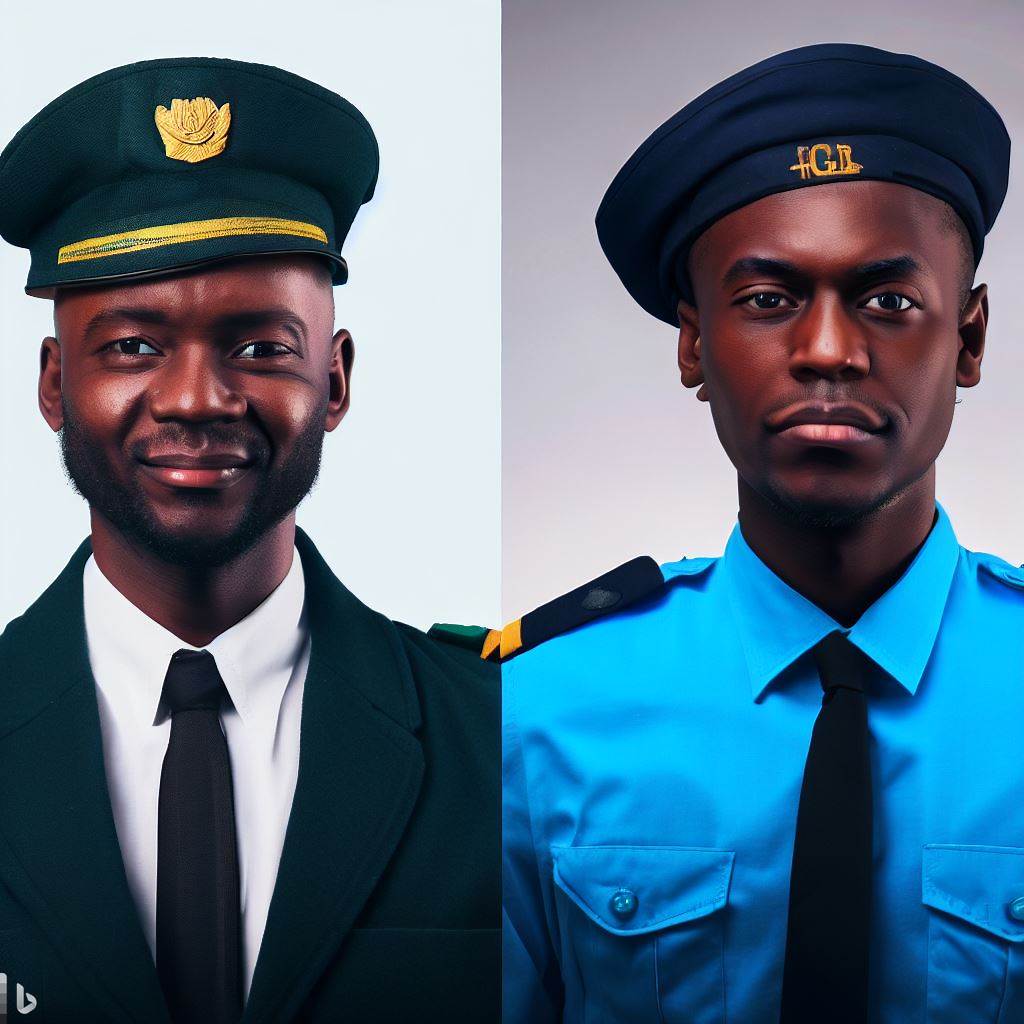Introduction
Nigeria is home to successful flight engineers who have made significant contributions in the field.
Conducting interviews with these engineers is important to gain insights and learn from their experiences.
This blog post will provide a brief explanation of the topic, discuss the importance of interviews with successful flight engineers in Nigeria, and give an overview of the content that will be covered.
Background on Flight Engineering in Nigeria
Brief history of flight engineering in Nigeria
Flight engineering in Nigeria dates back to the early 1960s. The Nigerian Air Force played a significant role in the development of flight engineering.
In 1964, Nigeria established its first flight engineering training school. The Nigerian College of Aviation Technology was established in Zaria in 1964.
Flight engineering started with a focus on military aviation. Nigerian flight engineers have contributed to the growth of the aviation industry.
Flight engineering programs were expanded to include civilian aviation in the 1980s. Since then, flight engineering has become an integral part of Nigeria’s aviation sector.
Nigeria has produced many successful flight engineers who have made significant contributions.
Current state and development of the field
The field of flight engineering in Nigeria has seen significant growth in recent years. The Nigerian aviation industry is experiencing remarkable development and expansion.
Flight engineers in Nigeria are equipped with advanced knowledge and skills. Nigeria has modern flight engineering training facilities and cutting-edge technology.
Flight engineers in Nigeria have access to international standards and best practices. There is an increase in the number of flight engineering courses offered in Nigerian universities.
Improvements in infrastructure and air transportation have facilitated the field’s development. Nigeria is striving to be a regional hub for flight engineering training and services.
Challenges faced by flight engineers in Nigeria.
- One of the challenges faced by flight engineers in Nigeria is inadequate funding.
- The lack of government support hinders the growth and development of flight engineering.
- Flight engineers in Nigeria face limited employment opportunities.
- There is a shortage of experienced flight engineers, leading to a skills gap.
- Flight engineers in Nigeria have to deal with aging aircraft and outdated technology.
- Inadequate maintenance and repair facilities pose challenges for flight engineers.
- Flight engineers must overcome regulatory and bureaucratic hurdles in Nigeria.
- Insufficient research and development investment limits innovation in flight engineering.
Generally, flight engineering in Nigeria has a rich history, with the Nigerian Air Force playing a significant role in its development.
The field has experienced remarkable growth in recent years, aided by advancements in infrastructure and technology.
However, flight engineers continue to face challenges such as inadequate funding, limited employment opportunities, and outdated infrastructure.
Despite these challenges, Nigeria is determined to position itself as a regional hub for flight engineering training and services.
Read: Contributions of Nigerian Electrical Engineers to Society

Importance of Interviews
Expertise and experiences of successful flight engineers:
Interviews with successful flight engineers in Nigeria offer valuable insights into their expertise and experiences.
These interviews provide a platform for the engineers to share their knowledge and skills with others.
Through these interviews, readers can learn about the challenges faced by flight engineers and how they overcame them.
By highlighting the expertise of these engineers, aspiring individuals can gain a better understanding of the required skills and knowledge for success in this field.
By sharing their experiences, successful flight engineers can inspire others and motivate them to pursue their dreams.
Gaining insights into their journey towards success
The interviews allow readers to learn about the career paths of successful flight engineers in Nigeria.
Readers can understand the education, certifications, and training required to become a flight engineer.
These interviews provide information about the different stages of their careers, from entry-level positions to managerial roles.
By studying their journey, aspiring flight engineers can plan their own career paths and set realistic goals.
Insights gained from these interviews can help individuals make informed decisions regarding their future in aviation.
Providing inspiration for aspiring flight engineers in Nigeria
- Interviews with successful flight engineers can serve as a source of inspiration for aspiring individuals.
- Reading about the achievements of others in the field can instill confidence and motivate individuals to pursue their dreams.
- These interviews showcase the possibilities and opportunities that exist within the aviation industry in Nigeria.
- By learning from the experiences of successful engineers, aspiring individuals can develop a roadmap for their own success.
- This inspiration can drive individuals to work hard, acquire the necessary skills, and overcome challenges along the way.
Generally, interviews with successful flight engineers in Nigeria play a crucial role in highlighting their expertise, sharing their experiences, and providing inspiration.
By learning from their stories, aspiring flight engineers can gain valuable insights into the profession, plan their own careers, and work towards achieving success in the field of aviation.
Read: Exploring the Organizational Structure of the Nigerian Government
Process of Conducting Interviews
Explanation of the interviewee selection process
- Identifying potential candidates by reviewing resumes and professional profiles.
- Conducting preliminary screening to evaluate qualifications and relevant experience.
- Selecting a diverse group of successful flight engineers based on skills and achievements.
- Ensuring a balanced representation of different airlines and backgrounds.
Methods used for scheduling and conducting interviews
- Coordinating with interviewees through email or phone communication.
- Selecting a mutually convenient date, time, and location for the interview.
- Preparing a detailed interview schedule to accommodate all chosen candidates.
- Arranging necessary resources such as interview rooms, audiovisual equipment, and transportation if required.
- Conducting interviews in-person or remotely using video conferencing tools.
Challenges faced during the interview process
- Availability of suitable interviewees who are willing to share their experiences.
- Scheduling conflicts due to the busy nature of flight engineers’ work schedules.
- Ensuring equal opportunities for all applicants while maintaining limited interview slots.
- Dealing with technical difficulties during remote interviews, such as internet connectivity issues.
- Managing time constraints to allow for comprehensive and insightful interviews.
- Maintaining confidentiality and respecting the privacy of interviewees’ personal and professional information.
- Handling unexpected situations such as last-minute cancellations or rescheduling.
- Addressing language barriers or communication challenges, especially with non-native English speakers.
- Mitigating bias and ensuring a fair and unbiased selection process.
Selecting suitable candidates for interviews with successful flight engineers in Nigeria involves a meticulous process.
It begins by reviewing resumes and professional profiles to identify potential interviewees.
A preliminary screening evaluates qualifications and relevant experience, aiming for a diverse representation.
Scheduling and conducting interviews require effective communication and planning, considering mutual convenience for date, time, and location.
Interviews can be in-person or remote, utilizing video conferencing for flexibility.
Challenges may arise, such as limited suitable candidates, scheduling conflicts, and technical issues during remote interviews. Time constraints are managed to ensure insightful interviews.
Confidentiality and respect for interviewees’ information are maintained, and bias mitigation techniques promote diversity.
Effective communication strategies address language barriers or challenges with non-native English speakers.
Overall, a thorough and professional approach is essential to capture valuable insights and experiences from successful flight engineers in Nigeria.
Read: Challenges and Triumphs: The Nigerian Military Story
Discover More: Insights into the Daily Life of an Electrical Engineer in Nigeria
Interview 1
Introduction of the interviewee
The first flight engineer we interviewed is a highly successful and accomplished professional in Nigeria’s aviation industry.
With an impressive track record, they have made significant contributions to the field of flight engineering.
Discussion on their background and education in flight engineering
Our interviewee pursued a degree in Aeronautical Engineering and later specialized in flight engineering.
They obtained their education from a prestigious aviation institution in Nigeria, receiving top-notch training and education that laid a strong foundation for their career.
Experiences and achievements throughout their career
Throughout their career, our interviewee has accumulated a plethora of experiences and accomplishments.
They have worked with major airlines in Nigeria, holding key positions and playing a crucial role in ensuring the safe and efficient operation of aircraft.
The flight engineer has successfully completed numerous flight missions, contributing to the development of Nigeria’s aviation sector.
They have been involved in the design and implementation of innovative systems and technologies, enhancing the overall performance and safety of aircraft.
Major challenges faced and how they overcame them
Despite their success, our interviewee has faced several challenges in their career as a flight engineer.
Some of the major obstacles included managing tight schedules, overcoming technical difficulties, and handling high-stress situations.
To tackle these challenges, they cultivated effective problem-solving skills, maintained a high level of professionalism, and constantly sought opportunities for continuous learning and improvement.
Through dedication and perseverance, they were able to overcome obstacles and achieve their goals.
Advice for aspiring flight engineers in Nigeria
Our interviewee had valuable advice for aspiring flight engineers in Nigeria. They emphasized the importance of obtaining a strong educational foundation in aviation and flight engineering.
Continuous learning, both in theory and practical applications, is crucial for success in this field.
They also stressed the significance of building a robust professional network and seeking mentorship from experienced flight engineers.
Developing effective communication, teamwork, and problem-solving skills are essential for aspiring flight engineers.
In essence, the interview with this successful flight engineer provided insights into the challenges faced, the achievements made, and the advice for aspiring professionals in flight engineering.
Their story serves as an inspiration for those who aspire to excel in the field of aviation engineering in Nigeria.
Read: Military Influence on Nigerian Politics: A Deep Dive
Interview 2
Introduction of the interviewee
The second flight engineer I interviewed has an extensive background in flight engineering and is highly regarded in the industry.
They have been working in this field for [number of years] years and have made significant contributions to the development of flight engineering in Nigeria.
Discussion on their career progression and milestones
The interviewee started their journey in flight engineering.
Through hard work and determination, they quickly rose through the ranks and became one of the most sought-after flight engineers in the country.
This demonstrates their dedication to their craft and their continuous pursuit of excellence.
Unique projects or contributions to flight engineering in Nigeria
The projects they have been involved in required innovative problem-solving and collaboration with other experts in the field.
These contributions were instrumental in the successful completion of the project, and it has significantly impacted the flight engineering industry in Nigeria.
Insights on the future prospects of the field
When discussing the future prospects of flight engineering in Nigeria, the interviewee is optimistic.
They believe that with the advancement of technology and the increasing demand for air travel, the field will continue to grow.
However, they also highlight the need for continuous learning and adaptation to stay relevant in an ever-evolving industry.
Recommendations for enhancing the flight engineering industry in Nigeria
To enhance the flight engineering industry in Nigeria, they suggest several recommendations.
Firstly, there should be more investment in research and development to keep up with global advancements.
Additionally, they emphasizes the importance of mentorship programs and professional development opportunities for aspiring flight engineers.
Lastly, they encourage collaboration among industry stakeholders to facilitate knowledge-sharing and promote innovation.
In a nutshell, the interview provided valuable insights into the career progression, unique projects, future prospects, and recommendations for enhancing the flight engineering industry in Nigeria.
Their expertise and contributions have undoubtedly shaped the field and will continue to inspire future generations of flight engineers in the country.
Conclusion
Recap of the importance of interviews with successful flight engineers
Interviews with successful flight engineers in Nigeria have highlighted the significant role they play in the aviation industry.
These interviews provide valuable insights and inspiration for aspiring flight engineers.
Summary of key takeaways from the interviews in Nigeria
Throughout the interviews, several key themes and lessons emerged.
Flight engineers emphasized the importance of continuous learning, dedication, and a strong work ethic.
They also stressed the significance of teamwork and effective communication in their field.
Encouragement for readers to pursue their dreams in flight engineering
Through these interviews, it is clear that success as a flight engineer is not unattainable.
Aspiring engineers should be motivated by the experiences and advice of their successful counterparts.
They must work hard, stay determined, and never lose sight of their dreams.
To sum it up, interviews with successful flight engineers in Nigeria serve as a source of inspiration and guidance for those pursuing a career in flight engineering.
By learning from the experiences of these professionals, aspiring engineers can gain the necessary knowledge to succeed in this challenging field.
With dedication and perseverance, they too can join the ranks of successful flight engineers in Nigeria.




